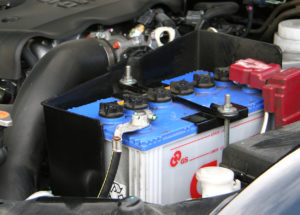Considering today’s economy, most of us are looking for ways where we can cut a few corners here and there. While there is definitely some wisdom to this way of thinking, there are some costs you just don’t want to skimp too much on. A car battery is one such example. While you might think you are saving a few bucks by buying a cheap battery at your local big box store, you could soon regret that decision when you are faced with a huge repair bill in a short amount of time!
Don’t believe us? Well check out this video of one unlucky client here at our Tempe auto repair shop, who found out why buying a cheap car battery isn’t always the best buy out there.
Isn’t that a crazy story? Spending up to $700 just to save 10 bucks – that just doesn’t make sense! So when the time comes, what should you consider when purchasing a car battery?
What’s The Difference?
The most common battery (and the oldest type of battery) is the lead-acid wet cell battery. There are also lead-acid dry cell batteries and absorbed glass mat batteries. Your auto mechanic can help you determine which one is the best for your vehicle.
Since many cars on the road today have lead-acid wet cell batteries, let’s concentrate on those today.
These types of batteries consist of lead plates which are separated by a material that is good at slowing the flow of ions from the positive to negative plates. While high quality car batteries will use rubber between the plates, many of the cheaper batteries consist of PVC separators, which don’t last as long. Cheaper batteries can also consist of lower quality components as compared to higher quality batteries, such as subpar cables and wires.
Does it Really Matter?
Well, like anything else, the quality of an any particular item comes down to its internal components. Just like you saw in the video above, cheaper parts can lead to acid sweating out of the battery, which then can result in a chemical reaction causing corrosion on the battery. That corrosion can grow like a cancer and seep down into the cables, which then leads to even more problems. So yes, purchasing a quality battery really DOES matter!
What Else Should You Consider in a Car Battery
 Well first and foremost, look beyond the PRICE of the battery and make sure you are purchasing a QUALITY battery instead. Check for manufacture dates, warranties, Cold Cranking Amp (CCA) ratings and the Reserve Capacity rating.
Well first and foremost, look beyond the PRICE of the battery and make sure you are purchasing a QUALITY battery instead. Check for manufacture dates, warranties, Cold Cranking Amp (CCA) ratings and the Reserve Capacity rating.
You don’t want to purchase a battery that has been sitting on the shelf for months on end, so check to make sure it was manufactured not too long ago. You can find the manufacture date listed as the month and year – 01/18 means it was manufactured in January, 2018.
The CCA rating shows how many amps need to be delivered to the starter at 32 degrees F for 30 seconds to maintain at least 1.2 volts per cell. In other words, the CCA determines how much power you will have to start your vehicle in cooler climates. If you happen to live where it gets really cold you will want a battery with a higher CCA rating.
The reserve capacity rating shows how long the battery can keep the electricals of the vehicle operating, in the event that the charging system fails. This measurement is indicated in minutes on the battery. A car battery with a reserve capacity rating of 90 means that the battery is able to keep the vehicle operating without the support of the charging system for an hour and a half.
The average car battery warranty is 3-4 years. If the car battery you are considering purchasing is anything less than that – put it back! Some batteries have even longer warranties which is great, but definitely don’t go less than 3 years.
Remember, we are always here to help you determine the best car battery for your individual vehicle. Our auto technicians can discuss the pros and cons of several different batteries with you, so you can make the most informed decision.
Schedule My Appointment Now!
